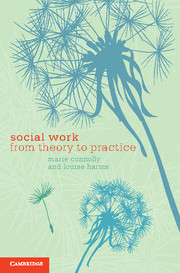Book contents
- Frontmatter
- Contents
- List of figures
- Preface
- Acknowledgements
- 1 Social work knowledge, theory and practice
- 2 Frameworks, models and practice
- 3 Ecosystems theories
- 4 Onion-peeling theories
- 5 Faulty-engine theories
- 6 Story-Telling Theories
- 7 Mountain-moving theories
- 8 Reflective practice and theory
- Concluding thoughts
- References
- Index
- References
8 - Reflective practice and theory
- Frontmatter
- Contents
- List of figures
- Preface
- Acknowledgements
- 1 Social work knowledge, theory and practice
- 2 Frameworks, models and practice
- 3 Ecosystems theories
- 4 Onion-peeling theories
- 5 Faulty-engine theories
- 6 Story-Telling Theories
- 7 Mountain-moving theories
- 8 Reflective practice and theory
- Concluding thoughts
- References
- Index
- References
Summary
THROUGHOUT THIS BOOK, we have explored the ways in which we bring theory to our practice as social workers. This process is a complex and continuing one. As theoretical understandings change and develop over time, and as service systems change, we continually develop our understandings, practice wisdom and insights. In chapter 1, we talked about social work's reflective interpretative lens, and we have referred to the importance of reflection in practice as we have explored theoretically informed ways of working. In recent years the concept of reflective and reflexive practice has emerged strongly within social work discourses as the complexity of the client and worker-in-situation has been at the forefront of professional concern (Sheppard 1998; Pease & Fook 1999). Social work as a profession has since been strong in emphasizing both the need for more formalized reflective practice and the opportunities that social work supervision presents to consider the ways in which practice can be improved through processes of critical reflection.
In this chapter, we look at the skills involved in critical reflection and how supervision can be one of the ways that supports optimal practice. Synthesizing some of the key ideas relating social work's interpretative lenses, we will also consider how social work as a profession benefits from engaging in reflexive, theoretically informed practice.
- Type
- Chapter
- Information
- Social WorkFrom Theory to Practice, pp. 163 - 176Publisher: Cambridge University PressPrint publication year: 2011



